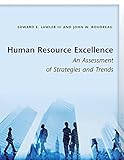Human resource excellence : an assessment of strategies and trends / Edward E. Lawler III and John W. Boudreau.
By: Lawler, Edward E., III [author.]
Contributor(s): Boudreau, John W [author.] | University of Southern California. Center for Effective Organizations
Language: English Publisher: Stanford, California : Stanford Business Books, an imprint of Stanford University Press, [2018]Description: 1 online resourceContent type: text Media type: computer Carrier type: online resourceISBN: 9781503603912 (pbk. : alk. paper)Subject(s): Personnel management | Organizational effectivenessGenre/Form: Electronic books.DDC classification: 658.3/01 LOC classification: HF5549 | .L28854 2018Online resources: Full text available at Ebscohost Click here to view| Item type | Current location | Home library | Call number | Status | Date due | Barcode | Item holds |
|---|---|---|---|---|---|---|---|
 EBOOK
EBOOK
|
COLLEGE LIBRARY | COLLEGE LIBRARY | 658.3/01 (Browse shelf) | Available |
"This book is the result of the Center for Effective Organizations' (CEO's) eighth study of the human resources (HR) function in large corporations"--Preface and acknowledgements.
Includes bibliographical references (pages 165-169) and index.
What HR needs to do -- What HR does -- The strategic role of HR -- HR decision science -- HR organization -- Measuring efficiency and impact -- The results of HR metrics and analytics -- Information technology in HR -- The effectiveness of HR -- Determinants of HR effectiveness -- Determinants of organizational performance -- How HR has changed -- What the future of HR should be.
As a field, human resources has been slow to evolve, despite a great need and opportunity for change. Human Resource Excellence delivers the newest findings about what makes HR successful and how it can add value to today's organizations. Tracing changes in a global sample of firms across the US, Europe, and Asia, this landmark volume provides an international benchmark against which to measure a company's HR practice. For over twenty years, USC's Center for Effective Organizations has conducted the definitive longitudinal study of the human resource management function. Analyzing new data every three years, the Center charts changes in HR and offers guidance on how human resource professionals can drive firm performance. In this latest survey, Edward E. Lawler III and John W. Boudreau conclude that HR is most powerful when it plays a strategic role, makes use of information technology, and has tangible metrics and analytics. Their insights offer an essential understanding of HR's changing role in strategy, big data, social and knowledge networks, and the gig economy.

There are no comments for this item.